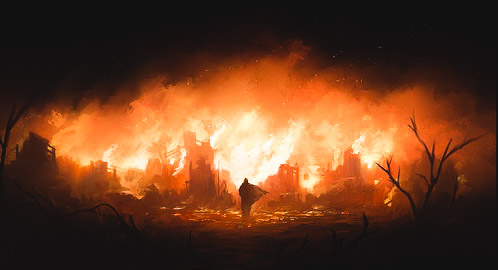By Owen Button, Y12
When Ezra landed on Onyx Beach at 1300 hours, it had been nearly three hours since the first of the Coalition’s soldiers had set foot on the sands of the Yafo wetlands. Nonetheless, he was still considered part of the first wave of troops, and the term had never before been used so accurately. Men were coming ashore now in tens of thousands, pouring out over every stretch of coast with the power of the rising tide. Already eight of the Coalition’s armies were ashore, with the number expected to triple by nightfall. Initial resistance to the invasion had been light, mostly appearing in the form of sparse armor divisions and Alliance air power. Now only the latter posed a serious threat to the beachheads, and the push for the Camp had begun.
Night fell quickly, and with it, the battles became short and fierce. The defenders were aware that they had been surrounded; backed into a corner, they nonetheless fought with all of their remaining strength to delay the inevitable. At Tslafon, a trio of alliance F-42 fighters swept across the battlefield, dropping their cluster bomb ordnance and killing nearly thirty tanks before turning and racing back east. Two were blotted from the sky by coalition missiles, their burning airframes smashing into the ground amidst alliance lines and adding to the unfolding carnage. Just a few miles farther, a division of T-28 tanks engaged a company of Mervakas in a brief, but bloody battle that resulted in the latter’s retreat, at the cost of another twenty of the former’s vehicles. Losses like these mattered little, however; the western armies numbered in the millions, and within hours, the guns of the far larger eastern coalition forces were thundering across the pre-dawn morning, announcing the proximity to their final target. The large-scale battles of midnight had been reduced to skirmishes, replaced instead by a desperate, delaying bombardment as the coalition began its terminal advance. The sea of soldiers slowly surged forward, winding through shadowed valleys as ordnance from friend and foe alike pounded the heights above them, until finally, the tide of troops broke into the open and saw their objective with clarity.
The Camp was a pillar of fire. From all sides, the glowing lines of coalition artillery fell like rain towards the city, and the Camp’s own weaponry rose into the air to meet it. Successful interceptions filled the sky with fireworks, while those less so were marked with billowing clouds of fire from below and a curtain of smoke that cast the battlefield into a dreamlike mirage. In spite of the chaos around him, Ezra became suddenly transfixed at the sight of the burning city; never before had he been so assured of their victory. The armies of the Coalition ringed the Camp in numbers too great to count, a sea of soldiers as far as his eyes could see. Already the Alliance’s stronghold had begun to crack, its walls crumbling under direct fire, and the cloud of smoke above growing larger with each strike at the city’s defenses. A distant, inhuman roar echoed across the battlefield, and the armies of the Coalition added their own cry to the crescendo, a chorus of defiance that rose into the air, proclaiming to the world their undeniable victory.
Yet something had changed. Some noticed it immediately; for others it took time. The voice of triumph was slowly and painfully contorted into a cry of confusion, and for the first time in the war, the armies of the coalition demonstrated a complete loss of discipline. Armored vehicles grounded to halt, artillery fell silent, and weapons dropped from the hands of even the most experienced soldiers as all eyes turned towards the heavens, where far above the smoke and haze of the battlefield, the sky had begun to burn.



